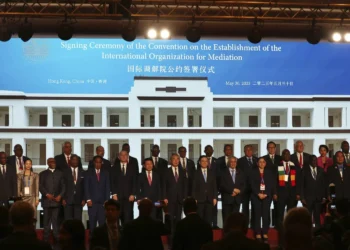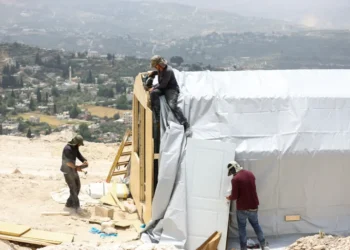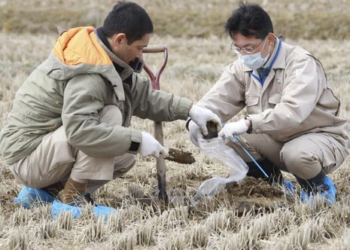China’s military has started a new round of war games with ships and aircraft near Taiwan.
In recent years, the country has stepped up its military activity around Taiwan, which it claims as its own.
The latest drills come just days after President William Lai Ching-te gave his first National Day address, promising he would resist any “annexation or encroachment” and that Beijing had no right to represent the island’s people.
According to Beijing, the exercises, dubbed Joint Sword-2024B, were a “stern warning to the separatist acts of ‘Taiwan Independence’ forces.”
Captain Li Xi, the spokesman for the Chinese military’s Eastern Theatre Command, disclosed that the drills were focused on sea-air combat-readiness patrol, blockade on key ports and areas and would also involve an “assault on maritime and ground targets.”
He added that the drills were a “legitimate and necessary operation for safeguarding state sovereignty and national unity,” and gave no date for their conclusion.
Taiwan’s Ministry of Defence expressed its strong condemnation of China’s “irrational and provocative actions.”
The ministry added that it had dispatched appropriate forces to “respond accordingly to protect freedom and democracy, and defend the sovereignty” of Taiwan.
Also, President William Lai Ching-te in a Facebook post reassured the people of Taiwan that the government will continue to defend the democratic and free constitutional system, protect democratic Taiwan and safeguard national security.”
Meanwhile, Bonnie Glaser, the Managing Director of the German Marshall Fund’s Indo-Pacific programme told a news agency that it was widely anticipated that the PLA [People’s Liberation Army] would conduct military exercises following Lai’s National Day speech.
“The drills have the effect of demonstrating to the domestic audience that the CCP [Chinese Communist Party] has the resolve to defend Chinese territory. They are also intended to warn Taipei and Washington not to cross Beijing’s red lines.”
Bonnie Glaser
Similarly, Lev Nachman, a Professor of political science at the National Taiwan University in Taipei, noted on X that China’s latest actions were no surprise.
“While military threats are no small matter, we all knew the PRC [People’s Republic of China] would respond to Lai’s Double Ten Day speech with military threats of some sort. There is no need to panic or overreact. We all saw this coming. It will pass quickly.”
Lev Nachman
Citing the Russia-Ukraine war, the conflicts in the Middle East and threats from North Korea, Kuang-shun Yang, Co-founder of the Taipei-based think tank US-Taiwan Watch, said that the drills could be China testing the waters internationally at a time of global upheaval.
“We can see that the world has a lot of regional flashpoints that are ongoing and maybe Beijing sees this as … an opportunity to test their will and see if the world’s support for Taiwan is strong enough.”
Kuang-shun Yang
US Expresses Concern Over Military Drills

The US said that it was “seriously concerned” at the latest military drills.
State Department Spokesman, Matthew Miller said in a statement that the PRC response with military provocations to a routine annual speech is unwarranted and risks escalation.
“We call on the PRC to act with restraint and to avoid any further actions that may undermine peace and stability across the Taiwan Strait and in the broader region, which is essential to regional peace and prosperity and a matter of international concern.”
Matthew Miller
Beijing has not ruled out the use of force to bring Taiwan under its control.
Beijing has sought to erase Taiwan from the international stage, blocking it from global forums and poaching its few remaining formal diplomatic allies.
The United States remains Taiwan’s main international supporter and supplier of weapons.
READ ALSO: EC Releases Ballot Statistics Ahead of 2024 General Elections







